ARGEN™ is a flexible tool for quickly assessing the stability and viability of therapeutic and biopolymer complexes. This article discusses the benefits of utilizing ARGEN for analyzing the effects of chemical and thermal stress on a monoclonal antibody (mAb).
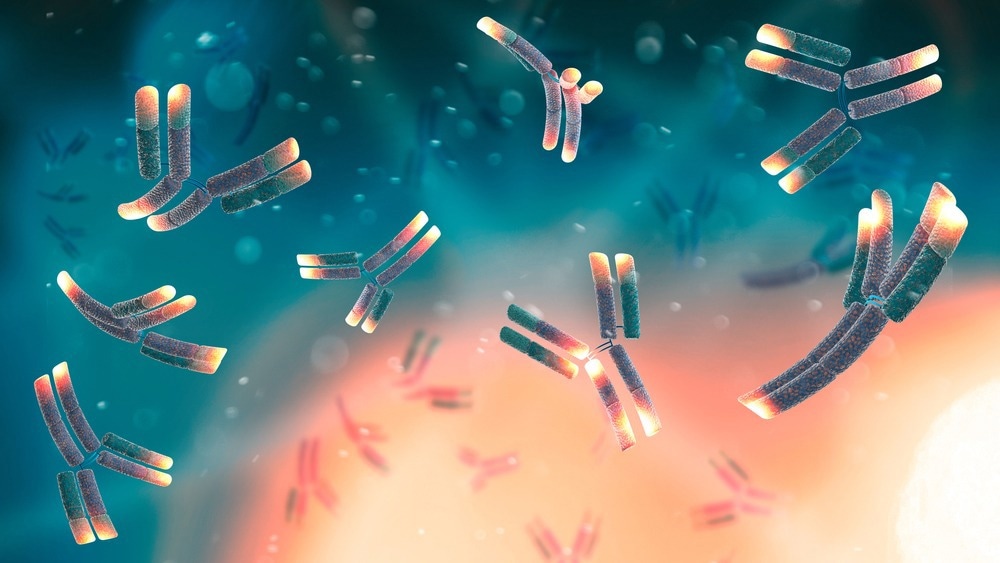
Image Credit: Naeblys/Shutterstock.com
ARGEN™: Smart and rapid therapeutic biopolymer development
ARGEN is a highly efficient instrument for quickly evaluating the stability and viability of therapeutic proteins, peptides, and biopolymers. The tool employs a multi-stressor testing platform based on static light scattering detection and user-friendly data processing. These capabilities allow researchers to produce biologic formulations up to 16 times faster.
How ARGEN™ works
ARGEN employs fixed-angle (90°) SMSLS (simultaneous multiple sample light scattering) technology to deliver quick, instantaneous, continuous data collection for defining qualitative and quantitative features of target molecules. The instrument has 16 independently controlled sample cells, allowing the user to simultaneously set thermal, chemical, and mechanical (stirring) stress parameters on all samples. This enables an exceptionally versatile approach to experimental design.
ARGEN™ intuitive control software
The ARGEN control software has an easy-to-use interface for every aspect of experimental design and autonomous control of all cells for parallel parameter modification and instantaneous data processing.
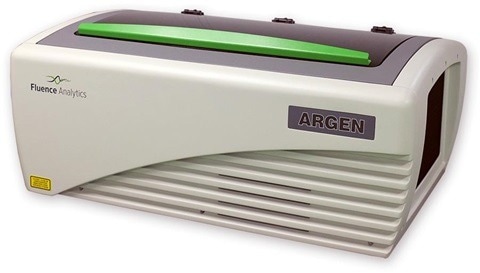
Image Credit: Yokogawa Fluence Analytics
Probing the thermal stability of a monoclonal antibody
These tests assess real-time fluctuations in the molecular weight of a monoclonal antibody over a spectrum of temperatures. Figure 1 displays the unfolding and subsequent aggregation versus time of a mAb in isothermal regimes with a temperature variation of 65 °C – 83 °C. Every curve (11 in total) represents the antibody's relative molecular weight (Mw(t)/ Mo) of the antibody versus time under an isothermal condition. Mw(t)/Mo refers to the normalized molecular weight ratio relating to the initial, non-aggregated sample mass. Mo signifies the molecular weight of the native, unaggregated protein, while Mw(t) refers to the average molecular weight of all native or aggregated species at a given point in time (t). Variations in the Mw(t) signal proportional changes in the aggregate mass and concentration, which are utilized to calculate the aggregation rate (AR). These tests easily enable thermostability characterization for the monoclonal antibody.
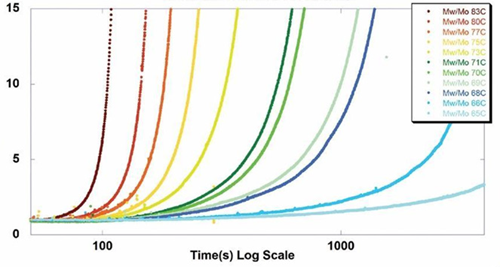
Figure 1. Isothermal denaturation and subsequent aggregation of a mAb vs. time from 65 °C–83 °C. Aggregation is represented by changes in relative molecular weight (Mw/Mo).
Aggregation Rate (AR) is derived from change in. Image Credit: Yokogawa Fluence Analytics
Effects of pH on monoclonal antibody stability
Figure 2 depicts the impact of pH on monoclonal antibody stability. When subjected to the same temperature and mechanical stress conditions, changes in pH significantly disrupted stability with varied aggregation rates, as suggested by the change in Mw(t)/Mo versus time. However, the aggregation rates varied between environments, offering valuable insights into optimal conditions for storage and purification. Experiments involving ARGEN under different solution conditions can yield important information from initial development to downstream production and processing.
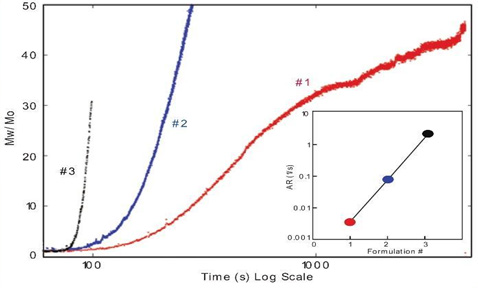
Figure 2. Effects of pH on Aggregation Rate (AR). Aggregation is represented by relative molecular weight (Mw/Mo). Image Credit: Yokogawa Fluence Analytics
Coupling ARGEN data with size exclusion chromatography (SEC)
Data collected with ARGEN enables researchers to assess candidate quality and viability quickly. Mw/Mo output enables the speedy detection of abnormal aggregation rates and molecular weight changes, saving both time and resources needed to verify orthogonal technique. After identifying a suitable candidate utilizing ARGEN, it is possible to reconcile this information with SEC experiments or similar approaches, resulting in a more rapid comprehension of ideal formulation development settings.
Figure 3 shows the superimposition of the SEC elution profile and changes in Mw/Mo ratios from ARGEN of an mAb over time. ARGEN uncovers both aggregation rates and integrated changes in oligomerization states versus time, while SEC depicts discrete transitions from monomers to higher-order oligomers. Combining data from these strategies yields strong evidence for determining biopolymer stability.
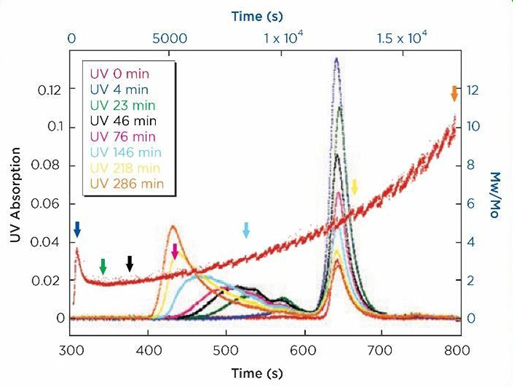
Figure 3. SEC elution profiles (UV absorbance) overlayed with Mw(t)/Mo output (ARGEN) vs. time (t) for a monoclonal antibody. Image Credit: Yokogawa Fluence Analytics
Conclusion
In these tests, ARGEN was utilized to analyze a monoclonal antibody's chemical and thermal stability and establish quantitative and qualitative features, including pH and temperature dependence on aggregation kinetics. Furthermore, SEC elution profiles were superimposed onto Mw/Mo output, producing a robust comparison and identification of the stability landscape for the mAb. These experiments highlight ARGEN’s strength and capacity to generate the relevant stability data needed to accelerate the development of therapeutic biopolymers.
About Yokogawa Fluence Analytics
Yokogawa Fluence Analytics, which was named as a Top 50 global advanced manufacturing startup by CB Insights, provides patented process analytics and control solutions to polymer and biopharmaceutical customers worldwide. Yokogawa Electric Corporation acquired Fluence Analytics in January 2023.
Yokogawa Fluence Analytics is a global leader in real-time polymer reaction monitoring and control, and its industry-leading ACOMP product is the only commercially available smart manufacturing system that continuously monitors and measures polymerization reactions.
The company’s biopharmaceutical product line includes a high-throughput static light scattering instrument called ARGEN. ARGEN can independently measure the stability of biopolymers under thermal, chemical, and mechanical (physical) stress, while also performing shelf-life stability studies at low temperatures.
Sponsored Content Policy: News-Medical.net publishes articles and related content that may be derived from sources where we have existing commercial relationships, provided such content adds value to the core editorial ethos of News-Medical.Net which is to educate and inform site visitors interested in medical research, science, medical devices and treatments.